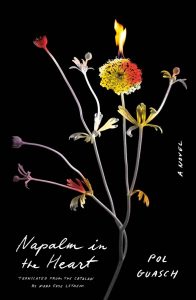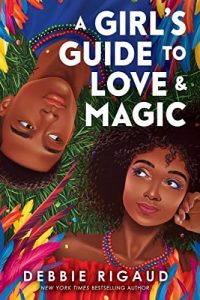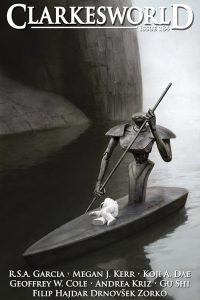Napalm in the Heart by Pol Guasch: Review by Ian Mond
 Napalm in the Heart, Pol Guasch (Faber & Faber UK 978-0571375257, £6.99, 256pp, hc) July 2024. (FSG Originals 978-0-37461-295-5, $18.00, 256pp, tp) August 2024.
Napalm in the Heart, Pol Guasch (Faber & Faber UK 978-0571375257, £6.99, 256pp, hc) July 2024. (FSG Originals 978-0-37461-295-5, $18.00, 256pp, tp) August 2024.
Reading Pol Guasch’s debut, Napalm in the Heart, right after Helen Phillips’ Hum is a disorientating experience. Both authors present us with dystopias, but while Phillips cleaves to our reality, Guasch gives us something more symbolic and experimental, a dystopia unmoored from time and place (which it has in common with Thomas More’s Utopia). It’s not just the abstract setting. Guasch’s short novel, which won the Premi Llibres Anagrama de Novella in 2021 and is superbly translated from Catalan by Mara Faye Lethem, is an eclectic assortment of voice and mode: a mixture of epistolary, photography, and poetry that combines into a not-quite coming-of-age story that’s strange, violent, intimate, and utterly original.
This is what we’re told: “First there was an incredibly loud bang, the light that emerged from the Factory veiling the sky for hours and then, silence. An implacable, opaque silence.” We can only speculate as to what happened in the Factory, what caused the light to be so bright that “[they] found circles of fish floating in the water and flocks of birds on the ground, gathered one last time to die together” and why some people fled from the village, and others stayed behind. We also can only speculate about the country where this catastrophe took place (it feels Eastern European but could be anywhere) or the identity of the shaved-head soldiers who bring “the old ladies their pensions and delivered our letters.” What we do know is that it’s been more than 900 days
since the event and that our unnamed narrator, a teenager who remained in the village with his mother, is in love with Boris, a young man living in the city. He writes letters to Boris, reporting on the man with the shaved head who is courting his mother (“[I] found him sitting at the table. And I thought I saw Mother beside him, small, as if his arrival had shrunk her”). In between the letters, there are moments of reflection, vignettes with headings like “Moon” and “Crusade” and “Desire,” where our narrator discusses his relationship with Boris, the horrid death of his grandfather and father (who the narrator found “hanged like a calf in the middle of the dining room”), his hatred for the man with the shaved head and his next-door neighbours, Vita and her sister, “the one with the weird face.” But after the narrator ruthlessly murders the man with the shaved head, hoping it will save his mother, he realises he needs to leave the village with Boris and find a safe place where they can live in peace together.
An argument can be made that Napalm in the Heart is not a dystopian narrative because there’s little sense of who is in control or how the society is governed – beyond references to the bald soldiers and their tanks. But if there’s a haziness around the setting, the central theme, our protagonist’s loss of liberty, has strong dystopian overtones. The narrator tells us early on that he “loathed being bound to others not out of free will, but by their slimy, vicious hatred.” He goes on to say that his “body mutated under others’ gazes…. My body sunk into a world it wasn’t built for. I lowered my tone. I spoke in a mumble… speaking in such a soft voice that only those who listened attentively could even hear me.” But this isn’t a dystopia of one. The feeling of imprisonment, of being diminished by an oppressive environment, is felt across the novel, whether it’s the farm where men are enslaved, forced to pick fruit, or the narrator’s mother who, in a letter she writes to her son that has the rhythm and quality of free-form poetry, talks about losing her language (“I would forget forget forget the legacy of my language”), sadly noting that “I made a son with a language that isn’t mine.”
Threaded between this need for liberty, freedom, and self-expression is a queer love story. The relationship between the narrator and Boris is intense. Their escape into the wider world should be a moment of ecstasy, yet, like much of this novel, it’s tainted with despair, tragedy, and violence. The past haunts them: a father who took his own life, parents murdered for being revolutionaries, ghosts given flesh by the corpse (I won’t say whose) mouldering in the back seat of Boris’s car – one of several grotesqueries that populate the novel. But there’s also tension between the two lovers, diverging views on what it means to be free, but also what it means to be in love. Guasch offers no easy answers, just the sensation of longing and loss.
Napalm in the Heart is a hard book to describe; that’s what makes it so powerful. Fleetingly, I was reminded of Tarkovsky’s Stalker – the narrator and Boris’s road trip into a world bleached of life and vibrancy – and the confessional poems of John Berryman – particularly “Dream Song 235” – and the work of W.G. Sebald – scattered in the second half of the novel are these gorgeous black-and-white photos taken by Boris, all chiaroscuro and mood – but mainly I was gripped by a work that stands alone, that’s strange and sad and beautiful.
Interested in this title? Your purchase through the links below brings us a small amount of affiliate income and helps us keep doing all the reviews you love to read!
Ian Mond loves to talk about books. For eight years he co-hosted a book podcast, The Writer and the Critic, with Kirstyn McDermott. Recently he has revived his blog, The Hysterical Hamster, and is again posting mostly vulgar reviews on an eclectic range of literary and genre novels. You can also follow Ian on Twitter (@Mondyboy) or contact him at mondyboy74@gmail.com.
This review and more like it in the September 2024 issue of Locus.
 While you are here, please take a moment to support Locus with a one-time or recurring donation. We rely on reader donations to keep the magazine and site going, and would like to keep the site paywall free, but WE NEED YOUR FINANCIAL SUPPORT to continue quality coverage of the science fiction and fantasy field.
While you are here, please take a moment to support Locus with a one-time or recurring donation. We rely on reader donations to keep the magazine and site going, and would like to keep the site paywall free, but WE NEED YOUR FINANCIAL SUPPORT to continue quality coverage of the science fiction and fantasy field.
©Locus Magazine. Copyrighted material may not be republished without permission of LSFF.








